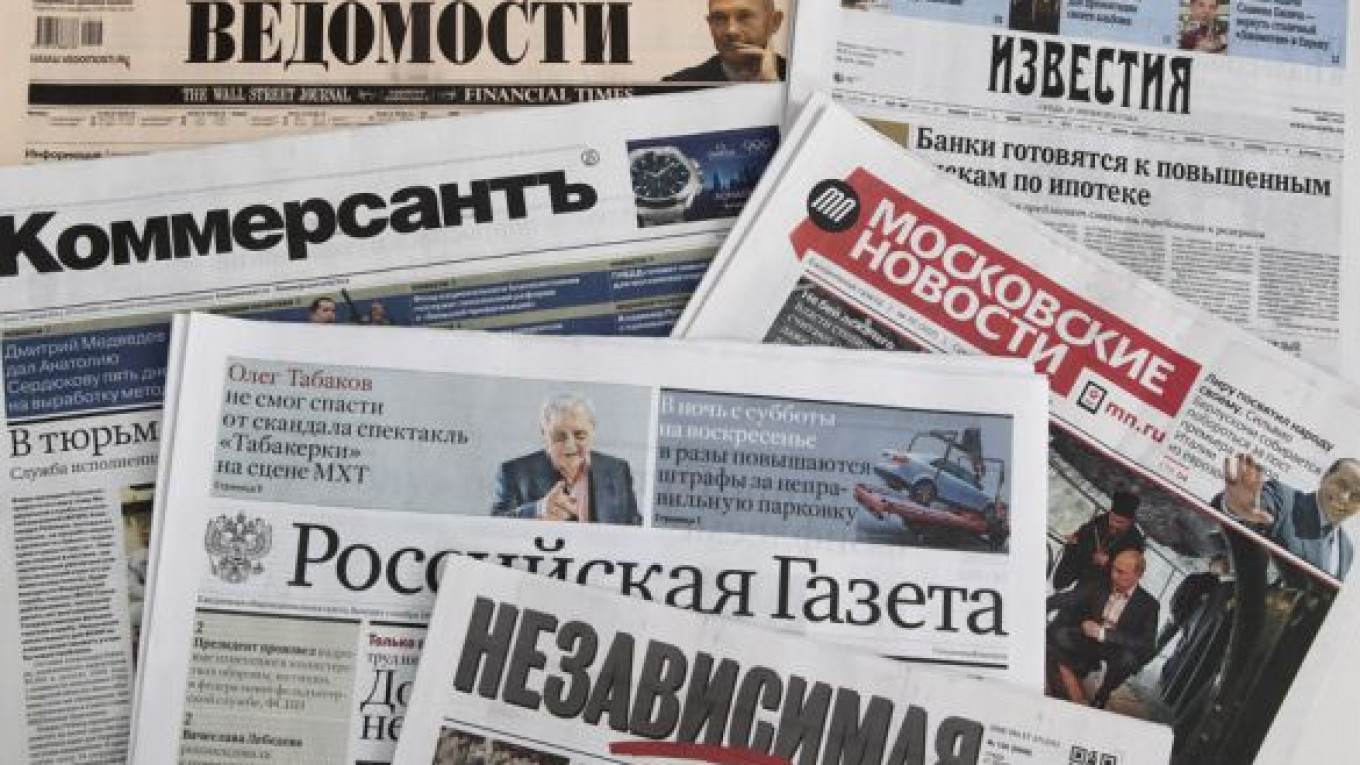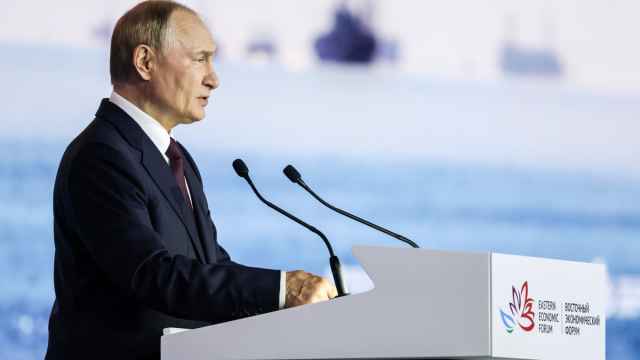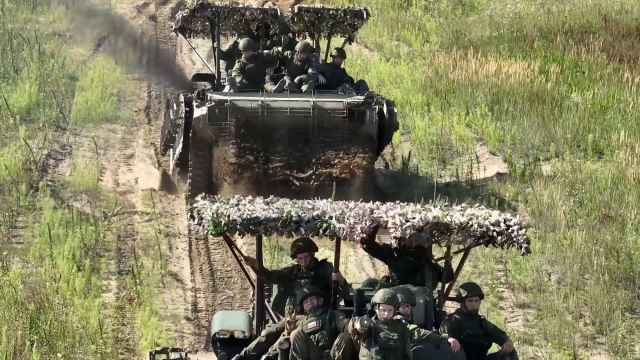Kommersant
1. Oleg Kashin article headlined "Water Goes Away" gives details of a deadly flood in the Krasnodar region and comments on the aftermath of the disaster; pp 1-2 (1,337 words).
2. Irina Granik article headlined "Either Everything Close Together or Nothing" says parliamentarians have reportedly suggested that all of the government bodies including the presidential administration should move to a new government center outside Moscow. Otherwise the parliament wants to go on working in the center of the city; pp 1, 4 (664 words).
3. Alexei Dospekhov article headlined "Man of Big Debt" says before his resignation, the former president of the Russian Football Union, Sergei Fursenko, had signed a contract with Manchester City coach Roberto Mancini to become the official coach of the Russian national team. The author notes that the Russian union lacks money to pay the coach; pp 1, 12 (914 words).
4. Sergei Sobolev article headlined "Third Advertisement Ring" outlines new regulations for outdoor ads adopted in Moscow; pp 1, 7 (636 words).
5. Alexander Chernykh et al. report headlined "Krymsk Steps Into One and the Same River Twice" says at least 170 people have fallen victim to the flood in the Krasnodar region; p 3 (1,386 words).
6. Irina Nagornykh article headlined "Vacant Leadership Position Opens in United Russia" says the head of United Russia's executive committee is to be elected by the party activists; p 4 (633 words).
7. Natalya Bashlykova et al. report headlined "Mikhail Prokhorov's Party Opens in Closed Regime" says the founding congress of Mikhail Prokhorov's Civil Platform party was held behind closed doors and without Prokhorov; p 4 (949 words).
8. Sofya Samokhina et al. report headlined "He Kept Correspondence and Changed Names" says a United Russia deputy in the State Duma has demanded that the Kirov region legislative assembly set up a commission to carry out a probe following the publication of correspondence between Governor Nikita Belykh and lawyer Alexei Navalny. The Communists are also displeased with Belykh who renamed streets in Kirov and want to demand his resignation; p 4 (799 words).
9. Makhachkala-based Yulia Rybina article headlined "Militants Surrounded by Robin Hoods and Policemen" says a video clip with unidentified people calling themselves Robin Hood's national front has appeared online. The video pledges to fight with militants and restore order in Dagestan without the involvement of law enforcement agencies; p 5 (455 words).
10. Yelena Chernenko article headlined "Russia Opens Afghan Transit" says Russia is not going to allocate financing for the development of Afghanistan as the West plans to allocate $16 billion for the country. Moscow will help the coalition forces leave Afghanistan; p 6 (576 words).
11. Maria Yefimova article headlined "Libya Splits Into Two Parts" says Libya's oil-extracting east has ignored the parliamentary elections, proving the theory that the country is falling into parts; p 6 (460 words).
12. Darya Nikolayeva article headlined "Hard Work More Profitable Than Thrift" says the Russian government is discussing a new pension reform in which work experience will count rather than the amount of pension savings made by a person; p 6 (639 words).
Nezavisimaya Gazeta
1. Alexei Gorbachev et al. report headlined "Mystery of Wave" says residents of the Krasnodar region do not believe the official information about the natural reasons for the high death toll in the recent flood. People question why the authorities did not wake them up at night when the local water reservoir was discharged and water was approaching the town of Krymsk; pp 1, 4 (1,280 words).
2. Tatyana Ivzhenko and Viktoria Panfilova article headlined "Chinese Expansionism on Ukrainian Territory" says that amid the ongoing language bill row in Ukraine, the parliament allowed the government to raise $3 billion in Chinese investment for the development of agriculture. Experts believe China is getting ready to start buying farmland in Ukraine as the relevant law comes into effect next year; pp 1-2 (1,010 words).
3. Ivan Rodin article headlined "Vladimir Putin's Large Administration" says the Russian presidential administration, increased by 200 people, is not going to move outside the center of Moscow as part of the planned project to relocate government bodies; pp 1, 3 (695 words).
4. Igor Naumov article headlined "Moscow Saving Offshore Cyprus" says support to Cyprus is becoming a regular expenditure item for the Russian budget as Moscow is helping its businessmen using the Cyprus offshore scheme; pp 1, 4 (856 words).
5. Sergei Kulikov article headlined "Authorities Stuck at Pension Crossroads" says experts from the Organization for Economic Cooperation and Development have found the Russian pension system to be balanced despite the fact that the money accumulated by would-be pensioners is being eaten up by inflation; pp 1, 4 (782 words).
6. Nikolai Surkov article headlined "Cairo to Keep Old Alliances" says Saudi Arabia will be the first country visited by the new Egyptian president; pp 1, 6 (588 words).
7. Editorial headlined "Priests and Procurators" slams the Russian Orthodox Church for its hard-line stance on the trial of the Pussy Riot punk group; p 2 (524 words).
8. Vladimir Mukhin article headlined "Military Health Care to Undergo Demilitarization" says 7 million retired servicemen and their families are to lose the right to undergo medical treatment in military hospitals as a large part of them will be handed over to the Health Ministry; p 2 (653 words).
9. Grigory Zaslavsky article headlined "We Feel Bad Even Without Foreign Agents..." comments on the official reaction to the deadly flood in the Krasnodar region and notes that Prime Minister Medvedev distanced himself from the problem; p 3 (804 words).
10. Olga Shulga article headlined "Technical Congress of Technical Party" says experts doubt that billionaire Mikhail Prokhorov's party, Civil Platform, whose founding congress was held in Moscow, will be viable; p 3 (518 words).
11. Vladimir Skosyrev article headlined "U.S.A. Calls Afghanistan Key Ally" says Western countries are going to provide Afghanistan with $16 billion worth of support, while Washington has called Kabul its key ally, justifying the U.S. military presence in the country; p 6 (489 words).
12. Alexandra Samarina article headlined "In Politics: Sad Reality of Tightening Screws" says residents of Kaspiisk worried about the state of a nearby water reservoir had repeatedly asked the authorities to take measures in order to prevent floods similar to the one that killed dozens of people in the town. The author slams the authorities for turning a blind eye to real problems and to devoting too much time to virtual threats such as foreign agents or opposition protests; p 7 (489 words).
Vedomosti
1. Lilia Biryukova article headlined "Deadly Tornado" says the number of victims in the Krymsk flood could have been much smaller if the authorities had set up an effective system of informing people about natural disasters; pp 1-2 (1,390 words).
2. Dmitry Kazmin and Natalya Kostenko article headlined "They Will Defend Russia" says Duma deputies plan to use Russia's accession to the WTO to support domestic business. The parliament is drafting recommendations to the authorities; pp 1, 3 (761 words).
3. Irina Reznik interview with businessman Dmitry Klyuyev headlined "There Was Not Any Connection Between Me and Magnitsky" in which he speaks on his involvement in the case of the Hermitage Capital investment fund and denies corruption charges brought by the fund management against him; pp 1, 12 (4,562 words).
4. Editorial headlined "From Krasnodar to Krasnoyarsk" recalls recent natural disasters in Russia and notes that no conclusions were made by the authorities in order to prevent or minimize human casualties; pp 1, 4 (523 words).
5. Another editorial headlined "Do Not Take Without Asking" says the authorities should have asked people before discussing ways of investing their pension savings into dubious projects; p 4 (324 words).
6. Maxim Glikin article headlined "Man of Week: Alexander Prokhanov" comments on a documentary dedicated to journalist Alexander Prokhanov, well-known for supporting Putin, broadcast by the Rossia 1 TV channel; p 4 (320 words).
7. Natalya Kostenko and Alexei Nikolsky article headlined "Article for Navalny" says in an attempt to protect the ruling elite from opposition criticism, the State Duma is drafting a bill on slander and raising fines for moral damage; p 2 (473 words).
Rossiiskaya Gazeta
1. Ivan Yegorov article headlined "Calamity Comes" reports on the probe into the work of local authorities in the Krasnodar region, where a flood killed dozens of people; pp 1-2 (791 words).
2. Tatyana Pavlovskaya article headlined "Krymsk Wave" reports on the situation in the Krasnodar region following the deadly flood; pp 1-2 (1,267 words).
3. Kira Latukhina article headlined "Kremlin Reform" gives details of the reshuffle in the presidential administration; p 3 (633 words).
4. Sergei Ptichkin article headlined "Airshow Row" says the Russian aerobatic team, Russkie Vityazi, will not take part in the Farnborough International Airshow due to the red tape of Russian military bureaucrats; p 7 (405 words).
5. Vasily Voropayev article headlined "Annan Does Not Lose Hope" says UN envoy Kofi Annan has suggested that Iran and Saudi Arabia should be involved in resolving the Syrian conflict; p 8 (459 words).
Izvestia
1. Ilya Yushkov and Vladimir Suvorov article headlined "Krymsk Covered With Calamity" says residents of Krymsk are looking for people to blame for the high death toll in the recent flood; pp 1, 3 (1,684 words).
2. Veronika Sevostyanova and Yekaterina Karacheva article headlined "Management Replaced at Interior Ministry's Investigative Committee" comments on the reshuffle at the Interior Ministry's Investigative Committee where a number of senior officers resigned; pp 1, 5 (542 words).
3. Olga Tropkina interview with Krasnodar region Governor Alexander Tkachyov speaking on the flood and the work of local authorities dealing with the aftermath of the natural disaster; pp 1, 3 (481 words).
4. Anastasia Kashevarova article headlined "State Duma Prepares Indulgence for Businesses" says the State Duma is working on amendments to the Criminal Code making a number of business conflicts subject to the Administrative Code; pp 1, 5 (686 words).
5. Olga Zhermeleva interview with Communist Deputy Vladimir Bessonov who has been recently striped of his State Duma deputy immunity and is to be prosecuted for allegedly beating up a policeman; p 2 (329 words).
6. Dmitry Runkevich article headlined "Management Determined for Public Television" says the Public Chamber has elected the board of the Public TV to be set up in Russia, while some members of the chamber doubt that the TV will be in demand among Russian audiences; p 2 (361 words).
7. Olga Zhermeleva article headlined "Deputies Like 'Foreign Agents'" says the State Duma has voted for the controversial bill on NGOs in the first reading almost unanimously; p 2 (649 words).
8. Igor Yavlyansky article headlined "London Mayoral Office Demands That Russian Diplomats Pay $4.7 million" says the Russian diplomatic mission in London is facing a hefty fine for driving in parts of the city where one has to pay to enter; p 10 (404 words).
Moskovsky Komsomolets
1. Igor Karamzin and Ksenia Konyukhova article headlined "Disaster in Krymsk Could Have Been Forecasted and Prevented" says the deadly flood in Krymsk has shown that Russians cannot count on the authorities in either warning them about natural disasters or rescuing them; pp 1-3 (2,880 words).
2. Svetlana Samodelova article headlined "We Got Flooded by Authorities, Not by a Natural Disaster" reports on the situation in Krymsk following the deadly flood there; pp 1-2 (914 words)
3. Irina Sukhova interview with Viktor Volosukhin, director of the Institute of Hydrotechnical Facilities Security, which designed the reconstruction project for the water reservoir that flooded the town of Krymsk; pp 1, 3 (699 words).
4. Ignat Kalinin article headlined "Country of Mountainous Tsunami" says local authorities have no excuse for their failure to prevent human casualties in the flood in the Krasnodar region; pp 1-2 (539 words).
5. Andrei Yashlavsky article headlined "Libyans Vote With Fire" says the parliamentary elections held in Libya are unlikely to bring peace and stability to the country; p 5 (441 words).
Novaya Gazeta
1. Andrei Kolesnikov article headlined "Country of Philistines" says recent public opinion polls show that Russians are mostly critical about the authorities, however, they do not want to support the opposition. Moreover, government propaganda has succeeded in creating a negative image of the U.S.A., NATO and the EU among Russians; p 10 (495 words).
2. Yelena Masyuk interview with opposition activist Sergei Udaltsov speaking on his role in the protest movement, some opposition activists and Putin's regime; pp 7-9 (3,299 words).
3. Yulia Latynina article headlined "Issue of Survival" criticizes Russia's migration policy allowing private companies and government bodies to hire migrants as a cheap labor force while ignoring the problem of millions of Russians preferring to become alcohol and drug addicts instead of working; p 13 (842 words).
4. Larisa Malyukova article headlined "Public TV as Military Secret" says the Public Chamber is keeping silent over the shortlist of candidates to become members of the Public TV board. The paper proposes its own list of experts to shape the editorial policy of Public TV; p 21 (912 words).
Moskovskiye Novosti
1. Alina Garbuznyak interview with State Duma Deputy from United Russia Alexander Sidyakin, one of the authors of the controversial bill on NGOs; p 2 (620 words).
July 9, 2012/BBC Monitoring/©BBC
A Message from The Moscow Times:
Dear readers,
We are facing unprecedented challenges. Russia's Prosecutor General's Office has designated The Moscow Times as an "undesirable" organization, criminalizing our work and putting our staff at risk of prosecution. This follows our earlier unjust labeling as a "foreign agent."
These actions are direct attempts to silence independent journalism in Russia. The authorities claim our work "discredits the decisions of the Russian leadership." We see things differently: we strive to provide accurate, unbiased reporting on Russia.
We, the journalists of The Moscow Times, refuse to be silenced. But to continue our work, we need your help.
Your support, no matter how small, makes a world of difference. If you can, please support us monthly starting from just $2. It's quick to set up, and every contribution makes a significant impact.
By supporting The Moscow Times, you're defending open, independent journalism in the face of repression. Thank you for standing with us.
Remind me later.






